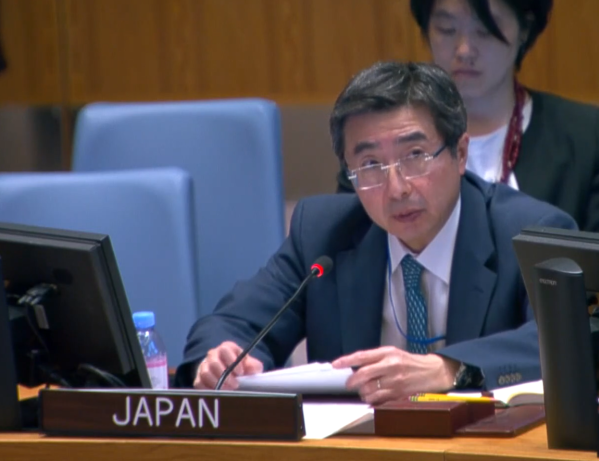中部アフリカ地域情勢に関する安保理ブリーフィングにおける石兼大使ステートメント
令和5年6月5日

(As delivered)
I thank Special Representative Abarry, His Excellency Ambassador Verissimo, and Ms. Tamoifo for their insightful briefings.
Japan commends the essential work of the United Nations Regional Office for Central Africa (UNOCA) in carrying out its good offices in coordinating cooperation with and between regional organisations, including the Economic Community of Central African States (ECCAS). Such enhanced coordination and partnerships are essential for regional peace and security.
Madam President,
Today I will focus on four challenges facing the region.
The first challenge is establishing and maintaining good governance and resilient democratic institutions. This requires continuous effort. Civic space, including freedom of expression, must be protected and political dialogue must be inclusive. The electoral system must also be transparent and credible.
In this regard, Japan echoes the recent calls by the African Union Peace and Security Council (AUPSC) on Chad. We expect the referendum on the new Constitution to take place as planned on 19 November.
Second, persisting insecurity is of great concern. We are seeing an increasing trend in armed conflicts, growing violent extremism, and heightened intercommunal tensions. The spread of hate speech and disinformation also has a destabilizing impact. Japan values the efforts of the regional initiatives and the efforts of regional states, along with UNOCA, to tackle these challenges. At the same time, we emphasize that such efforts need to respect human rights and include the voices of women and youth.
Third, we are gravely concerned about the dire humanitarian situation in the region. The clashes in Sudan are compounding the already volatile conditions. In this regard, Japan has decided to provide assistance to Sudan’s neighbouring countries to address the needs of refugees and returnees.
Japan also notes the ongoing humanitarian challenges in the North-West and South-West regions of Cameroon and laments that more than 600,000 people have been internally displaced. Japan expects all stakeholders, including the Government of Cameroon, to make further efforts to resolve the crisis in line with the recommendations that emerged from the 2019 Major National Dialogue. Japan reiterates its commitments to supporting UNOCA’s role in promoting inclusive political dialogue.
Finally, the adverse effects of climate change are exacerbating the region’s insecurity and humanitarian crises. The increasing scarcity of water and decreasing arable land are fuelling conflicts between farmers and pastoralists. Heavy rains, flooding and desertification are leading to loss of life and property as well as displacement. Japan applauds the initiative taken by UNOCA and other stakeholders in promoting coherence between peacebuilding and climate action policies. Japan will, for its part, continue to assist in strengthening the resilience of climate-vulnerable groups through enhancing climate change adaptation and climate disaster risk reduction.
Madam President,
Let me conclude my remarks by stressing the importance of ensuring a humanitarian-development-peace (HDP) nexus approach in an inclusive manner when tackling these challenges. Promoting human security should be at the centre of our efforts. Coordination and cooperation are needed from all stakeholders including International Financial Institutions (IFIs) and the entire UN system from the Peacebuilding Commission (PBC) and Economic and Social Council (ECOSOC) to Resident Coordinators (RCs).
Japan, in this respect, has been providing development assistance with an emphasis on institution building and human resource development. We remain committed to continue playing our part in promoting peace and stability in the region.
I thank you.
